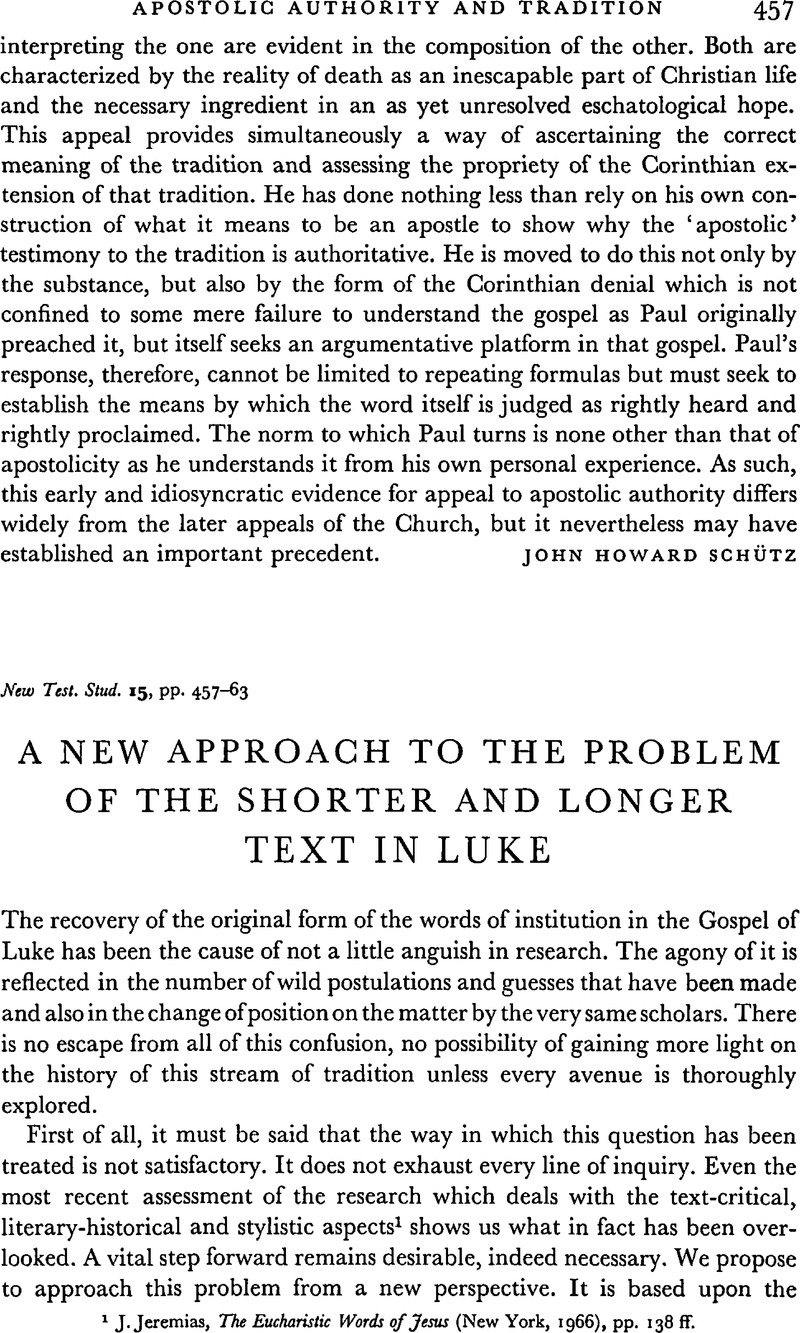Article contents
A New Approach to the Problem of the Shorter and Longer Text in Luke
Published online by Cambridge University Press: 05 February 2009
Abstract

Information
- Type
- Short Studies
- Information
- Copyright
- Copyright © Cambridge University Press 1969
References
page 457 note 1 Jeremias, J., The Eucharistic Words of Jesus (New York, 1966), pp. 138 ff.Google Scholar
page 458 note 1 Luke xxii. 21–3.
page 458 note 2 Winter, P., ‘The Treatment of his Sources by the Third Evangelist in Luke xxi–xxiv’, Studia Theologica,viii (1955), 158;Google ScholarRehkopf, F., Die lukanische Sonderquelle. Ihr Umfang und Sprachgebrauch (Tübingen, 1959), pp. 11 ff.Google Scholar
page 458 note 3 Verses 24–7.
page 458 note 4 Mark x. 41–5.
page 458 note 5 Verses 28–30.
page 458 note 6 Verses 31–4.
page 458 note 7 Verses 35–8.
page 458 note 8 Bultmann, R., The History of Synoptic Tradition (New York-Evanston, 1963), p. 276.Google Scholar
page 458 note 9 All Dibelius, M. (From Tradition to Gospel, New York, 1935, p. 200)Google Scholar says is that Luke invented the speeches at the table. Taylor, V. (The Formation of the Gospel Tradition, London, 1960, p. 56)Google Scholar says only that these sections ‘look very much like excepts from a collection of sayings’.
page 458 note 10 ‘Luke does not see in them (i.e. the speeches) a picture of his own time, but of the time of Jesus, a definite period in the past’, Conzelmann, H., The Theology of St Luke (London, 1960), p. 82.Google Scholar
page 459 note 1 In Mark the singling out of Judas constitutes the prelude to the institution of the Lord's Supper. He is excluded from the company which is about to witness the institution of the Lord's Supper.
page 459 note 2 Verse 21:πλήν Ιδού.
page 459 note 3 While Mark speaks about the traitor in the future tense Luke substitutes the present.
page 459 note 4 Verse 21:πλήν Ιδού ⋯ χειρ το⋯ παραδιδ⋯ ντος με με' ⋯μο⋯ ⋯π ιτ⋯ς τραπ⋯ℑης.
page 459 note 5 тράπεℑα, cf.verse 30; Acts xvi. 34.
page 460 note 1 Verse 27: ⋯γὼ δ⋯ ⋯ν μ⋯σῳ ὑμ⋯νεΙμι ὡς ⋯ 7dgr;ιακον⋯ν. Taken exactly these words do not make sense. In the scene of the supper itself depicted by Luke, Jesus does nothing which would suggest particularly the role of a servant. He sits at the table like his disciples. Moreover he even presides over the gathering.
page 460 note 2 Vööbus, A., The Prelude to the Lukan Passion Narrative. Tradition-, Redaction-, Cult-, Motif-Historical and Source-Critical Studies (Stockholm, 1968), pp. 22–47.Google Scholar
page 460 note 3 Vööbus, A., ‘Kritische Beobachtungen über die lukanische Darstellung des Herrenmahls’, Z.N.W. lix (in press).Google Scholar
page 461 note 1 This comes to the fore particularly in the declaration: ⋯γὼ δ⋯ ⋯ν μ⋯σῳ ὑμ⋯ν εΙμι.
page 461 note 2 Vööbus, , The Prelude to the Lukan Passion Narrative, pp. 49 f.Google Scholar
page 461 note 3 Verses 28–30.
page 461 note 4 Vööbus, op. cit. pp. 50 ff.
page 462 note 1 For a detailed discussion of these issues, see Vööbus, op. cit. pp. 104 ff.
page 462 note 2 Mark x. 41–5.
page 462 note 3 Verse 45: καΙ δο⋯ναι τ⋯ν ψυχ⋯ν αὐτο⋯ λ⋯τρον⋯ντΙ πολλ⋯ν.
page 462 note 4 This tradition belongs to a stream of primitive tradition which emerges in the Didache; Vööbus, A., Liturgical Traditions in the Didache (Stockholm, 1967), pp. 132 ff.Google Scholar
page 463 note 1 Of course it is still possible that originally the Gospel had here a different text, and the shorter text represents a second stage in the development. But this is only a possibility and as long as there is no evidence it cannot be taken seriously.
page 463 note 2 Vööbus, A., ‘The Eucharist in the Ancient Church’, Meaning and Practice of the Lord's Supper, ed. Lehmann, H. T. (Philadelphia, 1961), pp. 34 ff.Google Scholar; The Prelude to the Lukan Passion Narrative, pp. 77 ff.
- 2
- Cited by

